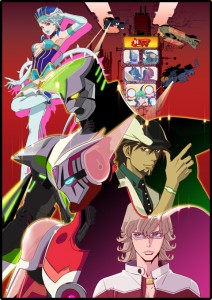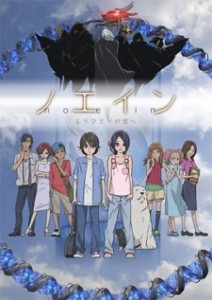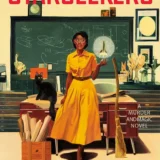As mentioned last week, I’ve been slacking off at Smofcon 32 and won’t be in touch with broadband again until it’s too late to submit this column. So in honor of the season, how about a few recommendations for shows you might give to your loved ones, or maybe make use of yourself to get through that dead time when there’s nothing to do?
Now, there are some standard recommendations when sf fans talk anime, but let’s face it, Cowboy Bebop was last century, and Evangelion is coming up on 20 years old. There has to be something more recent, hasn’t there?
So let’s come up with a few ideas for stocking stuffers under the following criteria:
- Keep it recent, as in first aired within the last 10 years.
- But not previously reviewed in this column.
- Short– under 30 episodes– so they don’t impose too large a commitment.
 Puella Magi Madoka Magica (12 episodes): An early contender for best anime series of this decade, Madoka Magica is one of those works which subverts an entire genre such that nothing can be the same again.
Puella Magi Madoka Magica (12 episodes): An early contender for best anime series of this decade, Madoka Magica is one of those works which subverts an entire genre such that nothing can be the same again.
Madoka is an ordinary girl until she meets Mami, a magical girl fighting “witches” that torment ordinary humans. Mami and Kyubey, a furry alien creature who helps the magical girls out, try to recruit her, but another magical girl warns Madoka not to accept the deal. And then things take a dark turn. And a darker one. And Madoka slowly figures out that the magical girls are trapped in an endless cycle of defeat that she must find a way to break…
If you’ve ever wondered why the name Gen Urobuchi excites anime fandom so much, it’s because of his work writing this series. But it’s not just the writing; the animation is top-notch with the pocket dimensions of the witches taking on a look wholly unlike any othe high-profile series.
At a mere 12 episodes, this is the shortest series on this list, but the one with the most powerful punch. It’s one of those classics you’ve got to watch sooner or later, so why not make it sooner?
 Tiger & Bunny (25 episodes): Kotetsu Kaburagi, known to the public as Wild Tiger, is a veteran superhero. Barnaby Brooks, Jr. is the new guy who flaunts tradition by using his real name and putting on a powersuit rather than the traditional spandex and cape. Together, they fight crime!
Tiger & Bunny (25 episodes): Kotetsu Kaburagi, known to the public as Wild Tiger, is a veteran superhero. Barnaby Brooks, Jr. is the new guy who flaunts tradition by using his real name and putting on a powersuit rather than the traditional spandex and cape. Together, they fight crime!
This being the modern world, they’re two of the stars of “Hero TV”, in which costumed heroes compete to see whose crimefighting is the best. Their outfits are decked out with sponsor logos. (For an added level of meta, the secondary sponsors are all real companies.) Points are awarded for speedy response and criminal captures. The heroes are an eclectic bunch, ranging from the odd couple of Kotetsu and Barnaby, to the gender-fluid black person who doesn’t have to care what people think of em because e is the CEO of eir own primary sponsor, to the white otaku with a power that would break most superhero plots but is rendered utterly useless by the Hero TV model, and more.
The first half of the series takes the conventional superheroes-vs-criminals approach, culminating in fight in which everyone has to team up against a supervillain couple reminiscent of the Joker and Harley Quinn. The second half reveals a terrible corruption at the root of Hero TV, and meanwhile, Kotetsu struggles with a personal problem of the sort rarely explored in a superhero setting– one which may spell the end of the career he loves.
Tiger & Bunny‘s answer to Metropolis and Gotham City is Stern Bild, which is clearly recognizable as Manahattan with an added layer of awesome in the form of airships, monorails, and an empire’s worth of heroic Graeco-Roman statuary. (Which is not just decoration– stay alert and you’ll start spotting a lot of inspiration from classical myths being worked into the story.)
Tiger & Bunny is Watchmen for our day and age, only much, much more fun than Watchmen.
 Moribito: Guardian of the Spirit (26 episodes): Balsa the spearwoman, traveling mercenary for hire, takes a job to protect the younger prince of a foreign land when the court believes he has been possessed by a “water demon”. Normally this would mean execution, but at the behest of the empress, Balsa sneaks Prince Chagum into hiding and protects him. Along the way, she learns that Chagum is definitely carrying something– but other lore suggests that the “demon” is really the answer to the drought plaguing the land. Unfortunately the end result may still be that Chagum must die…
Moribito: Guardian of the Spirit (26 episodes): Balsa the spearwoman, traveling mercenary for hire, takes a job to protect the younger prince of a foreign land when the court believes he has been possessed by a “water demon”. Normally this would mean execution, but at the behest of the empress, Balsa sneaks Prince Chagum into hiding and protects him. Along the way, she learns that Chagum is definitely carrying something– but other lore suggests that the “demon” is really the answer to the drought plaguing the land. Unfortunately the end result may still be that Chagum must die…
Based on a book by Nahoko Uehashi, who won the Hans Christian Andersen award for YA this year, Moribito is a stirring fantasy adventure in a meticulously constructed world. No generic inns here; the animals, the people, and their ways of living are all carefully thought out and become integral to the story. It’s also one of the most gorgeously animated shows I’ve ever seen.
This is an excellent show for anyone who loves pseudo-historical fantasy, original worlds, or peculiar ecology.
 Steins Gate (24 episodes): Rintarō Okabe is the alpha geek in a band of misfits. He plays at being mad scientist Kyōma Hōōin and dreams up imaginary enemies which oppose his work. It’s all harmless enough until the day he hears a terrible scream, finds a dead woman lying in a pool of blood, and then, shortly afterward, encounters the same woman completely alive and unaware of ever having been killed.
Steins Gate (24 episodes): Rintarō Okabe is the alpha geek in a band of misfits. He plays at being mad scientist Kyōma Hōōin and dreams up imaginary enemies which oppose his work. It’s all harmless enough until the day he hears a terrible scream, finds a dead woman lying in a pool of blood, and then, shortly afterward, encounters the same woman completely alive and unaware of ever having been killed.
The mysterious woman is Chris Makise, brilliant young actual scientist, and her peculiar resurrection turns out to have something with the discovery of an actual, albeit limited, form of time travel the same afternoon. At first it’s an amusement, but as Chris and Rintarō explore how to improve it, Rintarō’s fantasies of persecution by a secret quasi-governmental force start to become reality. Someone else has the secret of time travel, and they’re caught in a tangle of events resonating back and forth between the past and future.
It’s a great mystery as well as a unique time travel story, a romance, and a story of geek bonding. Not only does Rintarō have to save the world, the path to doing so lies through learning to be less of a jerk to the people he counts as his friends. It’s a very dark story in the second half, but with an amazing and tidy ending that makes everything the viewer suffers along with him worthwhile.
 Noein: To Your Other Self (24 episodes): Haruka is a seemingly ordinary girl having an ordinary life with her friends until the night that mysterious figures begin stalking them. The figures are the Dragon Cavalry, visitors from another timeline where 15 years in the future, humanity barely clings to civilization in a war with yet another possible future. The key to winning is an artifact called the Dragon Torc– and Haruka is bound up with it somehow.
Noein: To Your Other Self (24 episodes): Haruka is a seemingly ordinary girl having an ordinary life with her friends until the night that mysterious figures begin stalking them. The figures are the Dragon Cavalry, visitors from another timeline where 15 years in the future, humanity barely clings to civilization in a war with yet another possible future. The key to winning is an artifact called the Dragon Torc– and Haruka is bound up with it somehow.
Complicating matters further is that a rogue member of the Dragon Cavalry claims to be a future version of Haruka’s best friend, and that the Haruka in his timeline is already dead. And that neither of the possible fuures which are fighting to make all timelines converge on them offers humanity much hope. Lacrima, the Dragon Cavalry’s home, is a dystopian wasteland, but its competitor Shangri-La represents a far more horrifying fate.
Scratch the magical gloss and Noein is super-hard sf underneath. If multiverses and qunatum physics are your thing, this is your show.
All of these have English-language releases which you should be able to find by checking your favorite catch-all Internet retailer or anime specialist sites. If you’re lucky enough to be in the right country, you may be able to stream some of them.
And if that sounds like too much work, then let’s end with the obligatory plug for the company store. Just follow this link and purchase some lovely Amazing Stories posters to help keep this site running and the anime reviews flowing!










